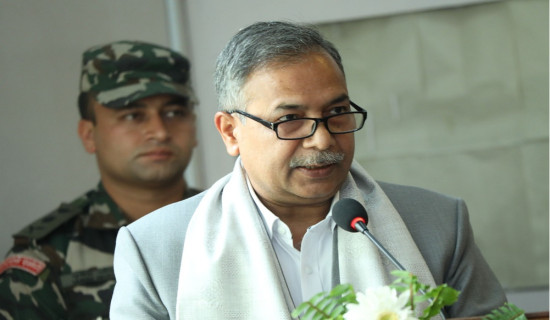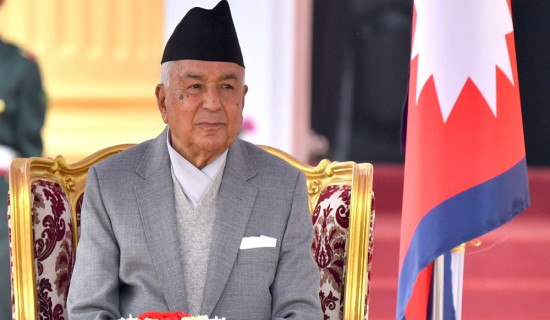- Tuesday, 3 March 2026
Why Politicians Need Moral Integrity?
A social media blog leaked out the information regarding the unsettled amount of rupees taken by some of the Lumbini Provincial Assembly members for the purpose of meeting their medical treatment expenses. The Provincial Assembly members comprise among those who are known for their wealth, assets and affluence. As some of them have declared their intent to contest the upcoming elections for the member of the federal parliament scheduled to be held in mid-November, this content of information may have some negative or damaging effect to prejudice their prospects in the hustling. Though this bit of information leaked out to the public through social media blog may be galling to the politicians as this may raise questions on their integrity and credibility, the content will nevertheless provide a useful data to general voters to judge the honesty, worth and merit of the potential candidates during the upcoming elections.
Sense of credibility
In fact, in a democratic polity where media exercises some semblance of freedom and has an access to state sources to seek and divulge the information, politicians need to be very careful and wary to ensure that they maintain their integrity and a higher sense of credibility lest they are exposed. A politician who secures an overwhelming mandate of the people to rule may be condemned and vilified in case he fails to tread cautiously and evenly along the democratically defined parameters and uphold the established values and norms.
Donald Trump is one of the examples in this regard. Trump was elected the US president with a thumping majority beating his rival candidate Hillary Clinton. However, his reckless style of functioning and propensity to breach the established rules and norms made him an unpopular and indicted president in the US political history. Despite this, he has made his intent public that he would contest the next presidential elections. But his opponents are hell-bent on vilifying and barring him to contest the polls. Several accusations have been labelled against Trump.
Basically, it is alleged that he was not willing to concede defeat respecting the mandate of the people and hand over the mantle of the White House to Joe Biden who had defeated him in the last presidential bid. He is also alleged to have incited to execute riot and arson in the Capitol Hill on the day when his successor was going to take oath of the office. These days, Donald Trump is facing the charge of stealing and removing the secret documents from the White House. The FBI sleuths have discovered four top secret documents and seven other sets of classified documents from Trump’s home. If he is found guilty of breaching law, it carries a penalty of up to 10 years in prison. This shows that a politician is watched from every quarter in a democratic society. A minor act of breach of law or a blot on the credibility risks his reputation throwing his or her political career into uncertainty.
A well-known political commentator in Great Britain A. A. Gill had observed interestingly about the rise and fall of leadership of former British Prime Minister Tony Blair saying “We called him a sociable man who worked very, very hard on being liked. He is by his own admission a people's person, a straight kind of guy, and he has done his best. But it counts for naught. He has left office of the prime minister truly loathed, mocked and despised." The aforesaid comment indicates that political leadership is a very challenging and uncertain destiny in a constitutional democratic system.
Tony Blair was elected to the office of the UK government obtaining a thumping majority of vote and securing greater trust of the people. Following the Iraq War, he lost the confidence of people. He faced a barrage of criticism not only of the opposition but also of the fellow leaders and functionaries within the party. He lost his political shine, turned out to be an object of ridicule and loath. In fact, in a democracy when there persists a gap between the expectations of the people and the performance of the political leadership, people start to harbour suspicion and become distrustful of him or her in a gradual manner. Moreover, if the surging expectations of the people remain unaddressed or unmet, people feel frustrated and tend to express their dismay and discontent that costs on the image of the political leadership dearly.
Grace period
In the society like ours when a popular leader wins the polls, voters wait for some period before they start to question his or her performance. S/he is allowed to bask in the comforts of grace period also known as the honeymoon period before voters start to subject him or her to scrutiny. The leadership is spared from criticism or attack assuming that he or she may be learning the craft of governance in running the state administration effectively and deliver results. Oftentimes, the popularity or unpopularity, like or dislike of a leader depends not on his or her real actions but the perceptions, make-believe image and stereotypes allowed to be created by the media and several other agencies and factors at play in a democratic system.
Morals and ethics are crucial for a political leader to survive the test of the popularity and sustain the trust of the people. Integrity is central to both moral and ethical leadership. The information leaked out about the financial integrity of the Lumbini Provincial Assembly members as mentioned at the outset of the article may be used as a tool to malign the image of the legislators which can cost dearly on them during the upcoming polls.
(The author is presently associated with Policy Research Institute (PRI) as a senior research fellow. rijalmukti@gmail.com)











-original-thumb.jpg)




